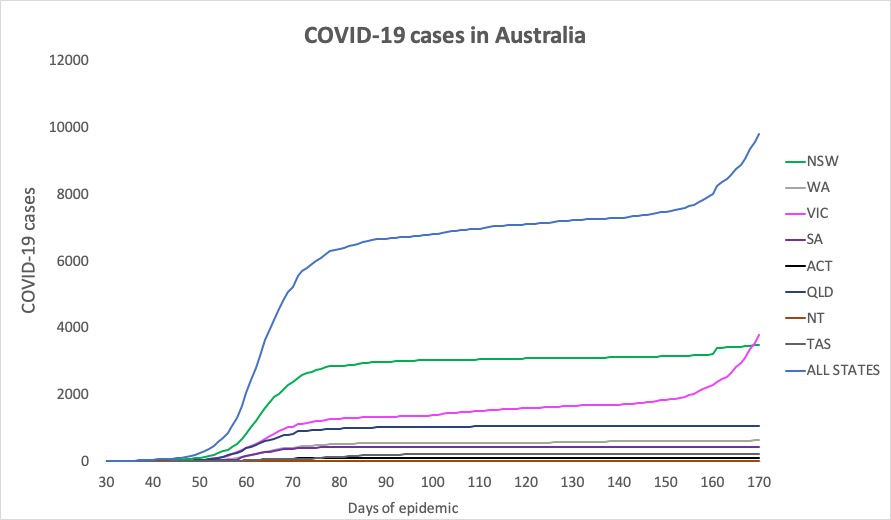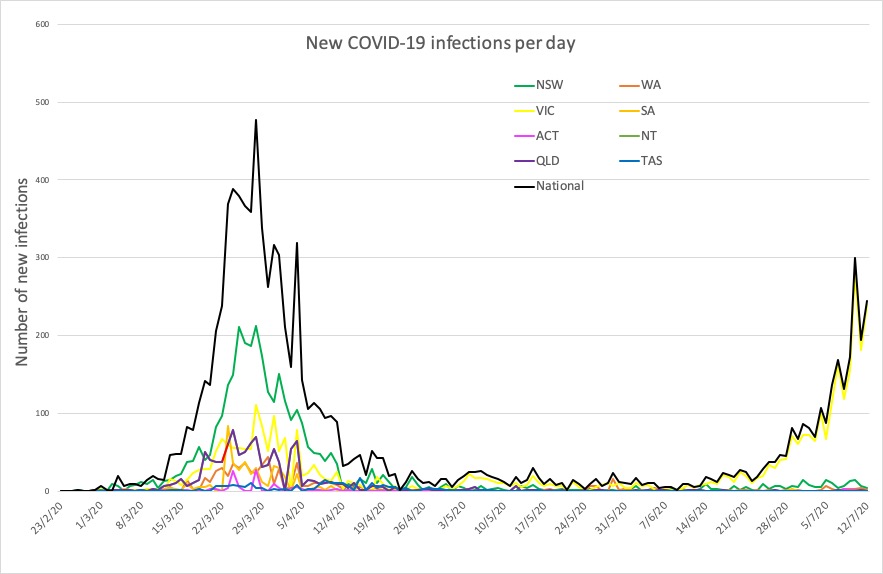The antiviral remdesivir has been granted provisional approval for use in Australia as a treatment for COVID-19.
Welcome to The Medical Republic‘s COVID Catch-Up.
It’s the day’s COVID-19 news into one convenient post. Got any tips, comments or feedback? Email me at bianca@biancanogrady.com.
13 July
- The TGA has granted provisional approval to antiviral remdesivir, for the treatment of severe COVID-19.
- SARS-CoV-2 in breastmilk may be deactivated with pasteurisation, study finds.
- PM and Victoria announce review of hotel quarantine.
- What assistance packages are available for businesses during the pandemic? The RACGP has a list.
- ACT reimposes visitor restrictions for hospitals and community health centres.
- UK hospital finds increased rate of stillbirth during pandemic.
- Victoria overtakes NSW in total number of COVID-19 cases.
- Remdesivir has been granted provisional approval for use in Australia as a treatment for COVID-19, according to the Therapeutic Goods Administration.
It’s the first treatment specifically for COVID-19 to be approved in Australia, and is indicated for use in adults and adolescent patients hospitalised with severe COVID-19 symptoms.
Provisional approval comes with a six-year time limit, because it is granted based on preliminary clinical data. The TGA said in a statement that the manufacturer Gilead can apply for full registration once it is able to provide more clinical data confirming the safety and efficacy of the drug.
Meanwhile, Gilead has released more data from its remdesivir studies, including the Phase 3 SIMPLE-Severe trial, in a press release and presentation at the 23rd International AIDS Conference. Its analysis found a 62% reduction in the risk of mortality among 397 patients hospitalised with severe COVID-19, compared to standard care, although the press release did not provide information on the statistical significance of that figure.
Nearly three-quarters of patients treated with remdesivir recovered by day 14, compared to 59% of patients who received standard care. The mortality rate at day 14 was 7.6% among those treated with remdesivir, and 12.5% among patients on standard care – a difference that was statistically significant. The study also found similar outcomes across different racial and ethnic patient subgroups. - SARS-CoV-2 in human breast milk appears to be deactivated by Holder pasteurisation, where the milk is treated at 62.5°C for 30 min, according to a study published in the Canadian Medical Association Journal. Donor breast milk is often used in the care of very low-birth-weight infants in hospital, hence the concern about the possibility of contamination with the virus.
- Australia’s hotel quarantine arrangements are being reviewed, focusing on issues such as staff training, testing of quarantined travellers, the link between hotel quarantine and community transmission, and support services for quarantined travellers.
Prime Minister Scott Morrison announced the review after the National Cabinet meeting last Friday. The Victorian government has also announced its own separate review of hotel quarantine. - Wondering what financial assistance or relief is available for general practices and other small businesses? The RACGP has collected the information on assistance packages available in each state and territory, including some new measures announced for Victoria late last week in response to the new restrictions.
- ACT hospitals and community health centres are reimposing visitor restrictions due to the recent increase in cases in the territory and in Victoria. From Monday 13 July, only one visitor is allowed per patient per day, except for children who are allowed a parent or carer at all times as well as an additional visitor, and women giving birth are allowed up to two support people.
- The incidence of stillbirth is significantly higher at one UK hospital during the pandemic, according to a paper published in JAMA.
Researchers at St George’s University Hospital in London saw a two-fold higher rate of stillbirths during February-June 2020 compared to the previous three months. However none of the 16 stillbirths (9.31 per 1000, compared to 2.38 per 1000 prior to the pandemic) during the pandemic were in women with symptoms COVID-19, and postmortem studies did not find evidence of SARS-CoV-2 infection.
The authors pointed out that many COVID-19 cases are asymptomatic, so the women could have been infected, but other pandemic-related changes may have played a role.
“Alternatively, the increase in stillbirths may have resulted from indirect effects such as reluctance to attend hospital when needed (eg, with reduced fetal movements), fear of contracting infection, or not wanting to add to the National Health Service burden,” they wrote. - Victoria has overtaken NSW in the total number of COVID-19 cases since the epidemic began, with 273 new cases reported on Sunday, nearly breaking its previous daily record of 288 cases set on Friday last week.
In addition to outbreaks in several public housing residence towers, there are now outbreaks linked to two aged care residential homes, and new cases reported in Box Hill Hospital, Brunswick Private Hospital and the Alfred Hospital.
New South Wales is on alert with 21 cases now linked to the Crossroads Hotel in Casula in south-west Sydney, one of which has since been linked to three new cases in their household. Authorities are requesting anyone who visited the hotel between 3-10 July to immediately self-isolate and get tested.
Nationwide, more than three million COVID-19 tests have now being conducted, with more than 53,000 in the last 24 hours alone.
Around Australia, here are the latest confirmed COVID-19 infections to 9pm Sunday (and the overall infections chart below shows how drastically things have shifted in the past few weeks):
National – 9797, with 108 deaths and 7728 recovered
ACT – 113
NSW – 3478
NT – 31
QLD – 1070
SA – 443
TAS – 228
VIC – 3799
WA – 635




